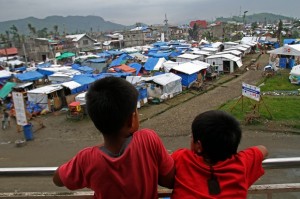WHO: ‘Yolanda’ folk near depression
At least 800,000 survivors of Supertyphoon “Yolanda” are estimated to have suffered from different levels of mental health problems, according to the World Health Organization (WHO).
“As many as 800,000 people among the displaced population could suffer from common or serious mental health disorders,” said Dr. Julie Hall, WHO country representative in the Philippines, in a news conference for the first anniversary of Yolanda, the world’s strongest typhoon in recent history.
Among the mental health problems found in Yolanda-hit areas are hallucinations, excessive anxieties, social withdrawal, changes in eating or sleeping habits, strong feelings of anger, substance abuse, excessive complaints of physical ailments, frequent outbursts of anger, hyperactivity, persistent nightmares and frequent temper tantrums.
Depression
Of the estimated 800,000 survivors, at least one in 10, or 80,000, are seen advancing into depression and are in need of treatment and more medical support, she added.
Article continues after this advertisementAnd as the country prepares for the commemoration of All Souls’ Day, the WHO official said there is a possibility that the
Article continues after this advertisementsupertyphoon survivors may again experience depression and other mental health problems.
“A lot of grief and depression may come back with the commemoration of the day of the dead. More people will probably be in need of mental health support,” said Hall.
‘Triggers’
The reappearance of reaction to the storm is common, according to WHO.
“Recurring emotional reactions … reminders such as rain can trigger upsetting memories of the critical incident,” said the WHO.
“These ‘triggers’ may be accompanied by fears that the stressful event will be repeated,” the WHO said.
Currently, Hall said there are only about 70 trained health professionals and almost 300 community workers attending to mental health problems in
areas devastated by Yolanda.
According to WHO, after immediate response to the typhoon, it began its work to promote the integration of mental health skills into the primary health care system.
“WHO is training a large (group) of health professionals in identification, treatment and support of people with mental health problems to improve their mental health status,” it said.
It added that it is now working with the Department of Health to provide basic training for psychosocial care for community workers on how to diagnose and manage common and serious mental health disorders.
Continued support
Also, the WHO said it is working with the Philippine Department of Health to
increase the capacity of hospitals and other healthcare facilities in terms of treating mental health patients.
As the country approaches the one year anniversary of the disaster, Hall said the international organization continues to support communities that have been devastated to help people there recover.
“We are grateful to all the donors who have funded our work,” Hall said, adding that the WHO received $17 million in donations.
“Together we aim to bring back a better, more resilient health system for the future. Together we are putting health at the heart of healing,” Hall said.
